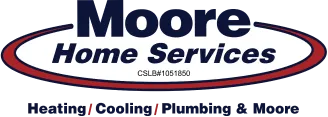Are Air Purifiers Worth the Investment?
Posted by Moore Home Services
Indoor Air Quality
We all want the peace of mind that our indoor air is clean. Changing your HVAC air filter is essential to helping prevent outdoor pollutants from coming inside. However, it can’t always filter indoor pollutants. If you want cleaner, fresher indoor air, consider adding an air purifier to your home. These air cleaners come in a variety of shapes, sizes, and price ranges.
What do Air Purifiers Filter, and Why Should I Use One?
Air purifiers are a great way to improve air quality in your home or office. They can be used for various purposes, but they primarily remove allergens from the air.
Air purifiers work by filtering airborne particles from the air passing through them. Typical household pollutants include dust, pollen, and mold spores. Removing these particles from the air makes breathing easier if you have allergies or asthma.
Air purifiers also help remove some types of germs and viruses from the air, preventing illness from spreading.
How do Air Purifiers Work?
Air purifiers use various methods to clean the air in your home. Some rely on filters to trap or remove particles and pollutants, while others use electrostatic precipitation or ionization to remove larger particles from the air.
Are There Different Types of Air Purifiers?
There are many different types of air purifiers, and they all have different features.
HEPA filters. These filters are designed to eliminate pollutants such as pollen and dust. They’re very efficient at removing allergens from the air but sometimes expensive. HEPA filters can be found in both portable and permanent units.
UV light. UV light is often used as an additional feature on a HEPA filter because it helps kill viruses, bacteria, and mold spores. The downside is that UV lights don’t work well when there’s humidity in the room.
Electrostatic precipitators. This type of filter uses an electric charge to attract particles floating in the air, causing them to stick together and fall onto a pad. Electrostatic precipitators tend to be more expensive than HEPA filters, but they don’t need replacing as often because they don’t collect pollutant particles in a filter.
What to Look for When Buying the Best Air Purifier for Your Home
Air purifiers are available in different types and designs, so you must choose wisely according to your needs. Some models are more effective than others, but they all work on the same basic principle of filtering out pollutants from the air. Their main difference is their size, shape, and efficiency in removing contaminants. You should also look at how easy they are to clean and maintain and how long they will last before needing replacement filters or other parts.
It’s also important to check how much noise they produce while operating and how much electricity they need to run effectively. While some models may be quite loud while working, others are quiet enough not to disturb anyone who sleeps in the same room; however, most people don’t want any kind of noise coming from their air purifiers if possible!
How Effective are Air Purifiers?
It depends on whether you use the right air purifier to suit your needs. For example, a HEPA filter air purifier will remove dust, pollen, and pet dander but won’t necessarily remove bacteria or viruses.
The best way to determine whether an air purifier is right for you is to talk with your doctor or another health professional. They’ll help you understand the specific pollutants affecting you and determine which air purifier model would work best for your situation.
How do I Get the Most out of my Air Purifier?
You can take a few steps to get the most out of your air purifier.
Brush your pets often. Dogs and cats can carry a lot of bacteria and other contaminants on their fur — and they shed those all over the place. If you don’t brush them regularly, you’ll quickly clog up your air purifier.
Book regular HVAC tune-ups. The best way to keep your home comfortable and healthy is by making sure your HVAC system is working at its best. Preventing pollutants from entering your home through the HVAC vents will stop your air purifier from working overtime.
Change bedding and vacuum every week. Vacuuming is one of the simplest ways to eliminate dust and allergens. Dust mites don’t just hang out on the bed; they also like to live in your pillows and blankets. Changing your blankets every week will help keep them at bay.
Minimize the use of candles. Burning candles can release smoke particles into your home’s atmosphere making your air purifier work harder.
An air purifier can keep you and your family safe from harmful pollutants in the air. Contact our Santa Rosa HVAC experts for more advice about keeping your home free from toxins.
